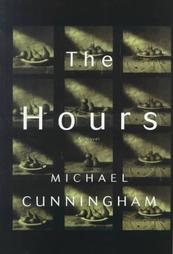
 I loved this book when I read it three years ago. Yes, it was three years ago--I found the grocery store receipt I was using as a book mark. Trust me, it was three years ago.
I loved this book when I read it three years ago. Yes, it was three years ago--I found the grocery store receipt I was using as a book mark. Trust me, it was three years ago.I loved this movie when I saw it. Really great performances by a well chosen cast. Julianne Moore was better in this movie than in Far From Heaven.
So, when my RL bookclub chose this for our February book--I didn't want to re-read it. It's really a good book, and worth discovering, but I wasn't sure I wanted to re-read it.
Because, as I remembered it, it was so depressing. Just so unhappy.
Admittedly, I read it in a time where I was coming out of some seriously painful depression. I was finally gaining some traction on happiness, but was still dealing with a lot of the pain that depression causes--in me, and in those around me. One of the things one deals with in depression, is the sense that if one was just good enough, strong enough, had just enough will power, it would just go away. The phrase "by the bootstraps" is one that applies--shouldn't you just be able to think your way out of it? Just suck it up and keep moving.
Of course, that's not how it works--or at least it didn't work that way for me. It took too many years of inadequate medication before I finally got the right combination, and started to recover my personality. So, the book had a lot of resonance with me. Laura Brown, the bookworm trapped in the housewife role of suburban L.A., with the small child she felt so inadequate to raise--I had a great deal of sympathy for that situation. How do you get through all those hours? Hours and hours until--what? It doesn't get better, but at least you get to read, or sleep, or something to ease the pain of all those hours.
Virginia Woolf, as imagined by Michael Cunningham, was also familiar. There is always the fear that the madness is returning. There is one powerful moment in the book when she stops still, feeling the headache coming on. There is that horrifying moment--is this it?--but no, it is not the headache. The madness is at bay.
Really, when you read The Hours, you don't question why Woolf killed herself, bu how she managed to wait eighteen years after Mrs. Dalloway before she did. Poor Laura Brown--she lasted another five years before she left, and hellish years they must have been. Not that anyone was a fault--there was nothing wrong with the people around these women, but brain chemistry is tremendously determinative.
At book discussion, one of my dear and lovely friends just couldn't bear Laura Brown. As with other books we have read where the mother tries to flee her job in the family, my dear dear friend just had no patience. "Once you are a mother, you just don't have the luxury of staying in bed and reading. Those kids are there and they need you, and you just have to suck it up, lady, and do what you need to do!"
I must say that my friend is a wonderful mother, and her kids are in high school or college, and she is seeing the light at the end of the tunnel, perhaps. Or, more likely, she is just too mentally healthy to fathom what depression is like. And good for her! But the need to escape is not just a luxury, or failure of will power. It is painful to stay, and painful to flee. Leaving behind your children is like gnawing your own leg off, but it was something Laura had to do or else she would have died. Attempted suicide was not a response to a bad day, and leaving her family was not done on a whim, but was the only alternative she could see. And I felt that deeply three years ago.
But I did re-read it, and found more hope and joy than I had remembered. Plus the writing--lordy, the writing! Precisely observed emotional states, conveyed moment by moment--the literary innovation Woolf achieved pushed beyond what she had been able to achieve. Because Cunningham's book doesn't just transpose Mrs. Dalloway to modern America, but it expands on the story, by exploring the differing responses the story makes on the writer, the reader, and the one who simply lives the life. Cunningham also places common elements in each story, but makes them fundamentally different so the connections resonate subconsciously.
For example, the yellow roses. Most obviously, Laura Brown makes yellow frosting roses for her husband's birthday cake. Virginia Woolf provides yellow roses for the bird funeral her niece and nephews hold. Clarissa's partner Sally buys yellow roses as a gift to Clarissa. All are disappointing in various ways. Laura put the roses on first, then tried to write between them with frosting, and felt she should have done it the other way around. Virginia's niece placed the roses around the bier and then laid the thrush inside the ring, and Virginia felt it should have been done the other way around.
It's a wonderful piece of writing, and Michael Cunningham was justly praised for that book.
One last note: my lovely and healthy friend provided our dessert that night--a cake with yellow frosting roses and "Happy Birthday Dan" on it.